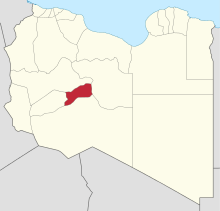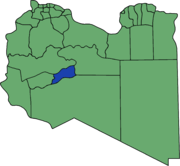Sabha District
- See sabhā for the Indian concept of "council".
| Sabha (سبها) | |
| District | |
| Country | |
|---|---|
| Capital | Sabha |
| Area | 15,330 km2 (5,919 sq mi) [1] |
| Population | 134,162 (2006) [2] |
| Density | 9 / km2 (23 / sq mi) |
 Map of Libya with Sabha district highlighted
| |

Sabha (Arabic: سبها Sabhā) is one of the districts of Libya. It is located near the center of the country, in the Fezzan region. The capital is the city of Sabha, with a population of 130,000.
The district populations' ethnicity is primarily a mixture of Arab, Bedouin, and Sub-Saharan African Black descent. People of each ethnicity ('unmixed') are also common.
Geography
The Sabha District is in the northwestern Libyan Desert section of the Sahara Desert.
The capital of Sabha is the largest and most important city of southern Libya. It has a small domestic airport. The Sabha Air Base is in the district.
The Gaberoun oasis, on a spring fed lake, is a rustic tourist resort and the site of Bedouin village ruins that is located in the district near Sabha city.
Neighboring districts
Sabha District borders the following districts:
- Wadi Al Shatii - north
- Al Jufrah - east
- Murzuq - south
- Wadi Al Hayaa - west
Settlements
The major settlements of Sabha District include:
- Sabha
- Samnu (سمنو)
- Tamanhant (تمنهنت)
- Umm al `Abid
- Umm al Ahrar
- Al Mahdia (المهدية)
- Az Zighan (الزيغن)
- Sukrah (Sakra) (سكرة)
- Al Nssiria
- Ghadduwah (Goddua) (غدوة)
- Hagiara
- Al Tanawia
Al Jadeed الجديد
Politics
In the Libyan civil war, Gaddafi forces maintained control of large parts of the district and city longer than elsewhere in the country. The National Transitional Council took control of the city on 11 September 2011.[3]
There are legal and illegal passenger buses that pass through the district from the southern Sahara/Maghreb/Sahel countries - such as Niger. The journey can take seven days from the border to Sabha city. It can be one of the more dangerous routes in the country, as it goes through the Libyan Desert. Bus drivers can lose their way and passengers sometimes die from lack of food or water. People from Ghana, Togo, and Sudan also come through Sabha to work in Libya, or in Europe via Tripoli and other North African Mediterranean Sea port cities.
References
- ↑ before 2007 administrative reorganization
- ↑ "Districts of Libya". statoids.com. Retrieved 27 October 2009.
- ↑ BBC News "Libya conflict: Anti-Gaddafi fighters take Sabha" - accessed 9.23.2011.
Coordinates: 27°02′N 14°26′E / 27.033°N 14.433°E
| ||||||||||
